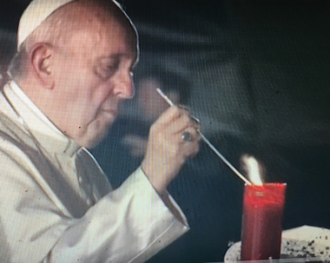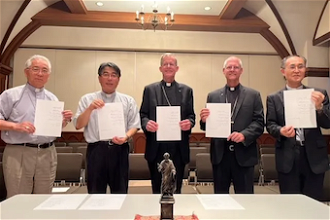Pope in Hiroshima: Possession of nuclear weapons is immoral

Pope lights candle at Hiroshima Peace Memorial
Source: Vatican News/JNS
At the end of his first full day in Japan, Pope Francis visited the Hiroshima Peace Memorial and described it as a place where death and life, loss and rebirth, suffering and compassion have met. He reaffirmed that not only the use, but the possession of nuclear weapons is immoral.
More than 70,000 people died instantly and another 70,000 died later from radiation burns after the nuclear bomb hit Hiroshima at 8.15am on 6 August 1945. The only building to survive the blast was the Genbaku Dome. Today its iconic ruin stands at the heart of the Hiroshima Peace Memorial Park as a reminder of the most destructive force ever unleashed by humanity, on humanity.
Standing before the A-Bomb Dome, the Pope said: "An incandescent burst of lightning and fire, so many men and women, so many dreams and hopes, disappeared, leaving behind only shadows and silence. In barely an instant, everything was devoured by a black hole of destruction and death."
Pope Francis said he had come to pay homage to the victims and to acknowledge the strength and dignity of the survivors. "We continue even today to hear the cries of those who are no longer," he said. "They came from different places, had different names, and some spoke different languages. Yet all were united in the same fate, in a terrifying hour that left its mark forever not only on the history of this country, but on the face of humanity."
The Pope said he had come to this place of memory and hope for the future, as "a pilgrim of peace", bringing with him "the cry of the poor who are always the most helpless victims of hatred and conflict". Pope Francis said he wanted to be "the voice of the voiceless, who witness with concern and anguish the growing tensions of our own time: the unacceptable inequalities and injustices that threaten human coexistence, the grave inability to care for our common home, and the constant outbreak of armed conflict, as if these could guarantee a future of peace."
The Pope declared once more: "the use of atomic energy for purposes of war is today, more than ever, a crime not only against the dignity of human beings but against any possible future for our common home. The use of atomic energy for purposes of war is immoral, just as the possession of atomic weapons is immoral", affirmed Pope Francis, and "we will be judged on this."
"Future generations will rise to condemn our failure if we spoke of peace but did not act to bring it about among the peoples of the earth." Peace must be "founded on truth, built up in justice, animated and perfected by charity, and attained in freedom," he added.
"If we really want to build a more just and secure society, we must let the weapons fall from our hands," continued the Pope. "How can we propose peace if we constantly invoke the threat of nuclear war as a legitimate recourse for the resolution of conflicts?" he asked.
"A true peace can only be an unarmed peace," because peace is not merely the absence of war, he repeated: "It is the fruit of justice, development, solidarity, care for our common home and the promotion of the common good, as we have learned from the lessons of history."
Pope Francis presented three moral imperatives: to remember, to journey together, to protect. We cannot allow present and future generations to lose the memory of what happened here. "It is a memory that ensures and encourages the building of a more fair and fraternal future; an expansive memory, capable of awakening the consciences of all men and women, especially those who today play a crucial role in the destiny of the nations; a living memory that helps us say in every generation: never again!"
We are called to journey together with a gaze of understanding and forgiveness, continued the Pope, "to open the horizon to hope and to bring a ray of light amid the many clouds that today darken the sky." Pope Francis invited us all to "open our hearts to hope, and become instruments of reconciliation and peace."
"This will always be possible if we are able to protect one another and realize that we are joined by a common destiny," he said. "Our world, interconnected not only by globalization but by the very earth we have always shared, demands, today more than ever, that interests exclusive to certain groups or sectors be left to one side, in order to achieve the greatness of those who struggle co-responsibly to ensure a common future."
Pope Francis concluded with a single plea "to God and to all men and women of good will, on behalf of all the victims of atomic bombings and experiments, and of all conflicts, let us together cry out: Never again war, never again the clash of arms, never again so much suffering!"
Watch a film of Pope Francis' visit: https://youtu.be/nRCNq6CWpo8
* Note: A single British Trident warhead is eight times more powerful than the bomb dropped on Hiroshima. A single Trident submarine carries up to 96 warheads. There are four Trident submarines based at Clyde Naval Base 25 miles from Glasgow.


















